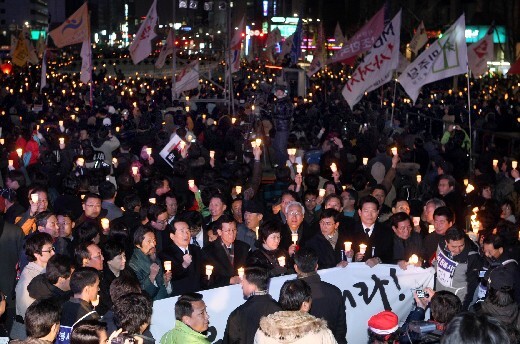hankyoreh
Links to other country sites 다른 나라 사이트 링크
After 22 years, civic groups and opposition parties unite to protest government

Civic groups and opposition party lawmakers held an event yesterday to protest against the Lee Myung-bak administration’s handling of a recent police raid on a demonstration in the Yongsan district that left six people, including one police officer, dead last month. The event drew around 10,000 participants, according to an estimate by organizers. (Police put the number closer to 4,000.) This is the first time that civic groups and opposition parties have come together to form a political front since the June 10, 1987, uprising against the dictatorship of Chun Doo-hwan.
Their sense of urgency in organizing the protest can be explained by three factors. In his second year in office, President Lee is showing few signs of changing his policy line or giving in to fierce public criticism. Opposition parties, which are battling a ruling party that commands a solid 172-seat majority in the 299-seat National Assembly, are struggling. Civic groups, which have lost a great deal of public support, are also facing a bumpy road.
Now, the two groups are bracing for a battle against the GNP, which is pushing for passage of a series of controversial bills in February’s extraordinary parliamentary session.
In a “letter to people,” read at yesterday’s event, the groups said, “President Lee and the ruling party are displaying a hallmark of the dictators: turning a deaf ear to the voices of the general public.” They added that they would work “with the people” to block passage of the controversial bills.
The opposition parties and civic groups plan to build support for their position both within the National Assembly and in the public sector. Both believe they will gain more political ground if they can block the ruling party from passing the bills, putting them in a solid position before the National Assembly by-election in April.
They also believe that the deepening economic crisis will work in their favor because it will put the government under increasing pressure to focus more on livelihood support to the poor.
Some are speculating that the formation of the coalition was, in part, aimed at winning the April by-election. The opposition parties seem to be of the opinion that they should unite to win the April 29 by-election, which is likely to be an interim assessment on how the government and the ruling party have fared in running state affairs over the past year.
Please direct questions or comments to [englishhani@hani.co.kr]
Editorial・opinion
![[Column] Life on our Trisolaris [Column] Life on our Trisolaris](https://flexible.img.hani.co.kr/flexible/normal/500/300/imgdb/original/2024/0505/4817148682278544.jpg) [Column] Life on our Trisolaris
[Column] Life on our Trisolaris![[Editorial] Penalties for airing allegations against Korea’s first lady endanger free press [Editorial] Penalties for airing allegations against Korea’s first lady endanger free press](https://flexible.img.hani.co.kr/flexible/normal/500/300/imgdb/original/2024/0502/1817146398095106.jpg) [Editorial] Penalties for airing allegations against Korea’s first lady endanger free press
[Editorial] Penalties for airing allegations against Korea’s first lady endanger free press- [Editorial] Yoon must halt procurement of SM-3 interceptor missiles
- [Guest essay] Maybe Korea’s rapid population decline is an opportunity, not a crisis
- [Column] Can Yoon steer diplomacy with Russia, China back on track?
- [Column] Season 2 of special prosecutor probe may be coming to Korea soon
- [Column] Park Geun-hye déjà vu in Yoon Suk-yeol
- [Editorial] New weight of N. Korea’s nuclear threats makes dialogue all the more urgent
- [Guest essay] The real reason Korea’s new right wants to dub Rhee a founding father
- [Column] ‘Choson’: Is it time we start referring to N. Korea in its own terms?
Most viewed articles
- 160% of young Koreans see no need to have kids after marriage
- 2[Column] Life on our Trisolaris
- 3[Reporter’s notebook] In Min’s world, she’s the artist — and NewJeans is her art
- 4Hybe-Ador dispute shines light on pervasive issues behind K-pop’s tidy facade
- 5[Editorial] Penalties for airing allegations against Korea’s first lady endanger free press
- 6Presidential office warns of veto in response to opposition passing special counsel probe act
- 7Vietnamese war victims speak of sexual violence by S. Korean troops for the first time
- 8S. Korea discusses participation in defense development with AUKUS alliance
- 9Japan says it’s not pressuring Naver to sell Line, but Korean insiders say otherwise
- 10Months and months of overdue wages are pushing migrant workers in Korea into debt